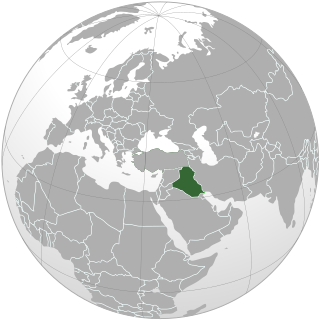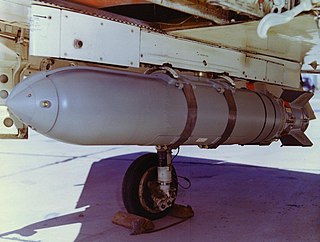
The Iraq disarmament crisis was claimed as one of the primary issues that led to the multinational invasion of Iraq on 20 March 2003.

The United Nations Monitoring, Verification and Inspection Commission (UNMOVIC) was created through the adoption of United Nations Security Council resolution 1284 of 17 December 1999 and its mission lasted until June 2007.

United Nations Security Council Resolution 1441 is a United Nations Security Council resolution adopted unanimously by the United Nations Security Council on 8 November 2002, offering Iraq under Saddam Hussein "a final opportunity to comply with its disarmament obligations" that had been set out in several previous resolutions. The United States used it as part of the legal justification for the subsequent US-led invasion of Iraq.

Iraq actively researched weapons of mass destruction (WMD) and used chemical weapons from 1962 to 1991, after which it destroyed its chemical weapons stockpile and halted its biological and nuclear weapon programs as required by the United Nations Security Council. The fifth president of Iraq, Saddam Hussein, was internationally condemned for his use of chemical weapons against Kurdish civilians and military targets during the Iran–Iraq War. Saddam pursued an extensive biological weapons program and a nuclear weapons program, though no nuclear bomb was built. After the Gulf War, the United Nations located and destroyed large quantities of Iraqi chemical weapons and related equipment and materials; Iraq ceased its chemical, biological and nuclear programs.
United Nations Special Commission (UNSCOM) was an inspection regime created by the United Nations to ensure Iraq's compliance with policies concerning Iraqi production and use of weapons of mass destruction after the Gulf War. Between 1991 and 1997 its director was Rolf Ekéus; from 1997 to 1999 its director was Richard Butler.
Richard William Butler, is a retired Australian public servant, United Nations weapons inspector, and a former Governor of Tasmania.

United Nations Security Council resolution 1284, adopted on 17 December 1999, after recalling previous relevant resolutions on Iraq, including resolutions 661 (1990), 687 (1991), 699 (1991), 707 (1991), 715 (1991), 986 (1995), 1051 (1996), 1153 (1998), 1175 (1998), 1242 (1999) and 1266 (1999), the council established the United Nations Monitoring, Verification and Inspection Commission (UNMOVIC) to replace the United Nations Special Commission (UNSCOM). It was the final resolution adopted in 1999.

United Nations Security Council Resolution 1696, adopted on July 31, 2006, after expressing concern at the intentions of the nuclear programme of Iran, the Council demanded that Iran halt its uranium enrichment programme.

The legality of the Iraq War is a contested topic that spans both domestic and international law. Political leaders in the US and the UK who supported the invasion of Iraq have claimed that the war was legal. However, many legal experts and other world leaders have argued that the war lacked justification and violated the United Nations charter.

United Nations Security Council Resolution 1905, adopted unanimously on December 21, 2009, after noting the letter from Prime Minister of Iraq Nouri al-Maliki, the Council extended until 31 December 2010 the arrangements for depositing proceeds from oil and gas export sales into the Development Fund for Iraq, established under Resolution 1483 (2003).

United Nations Security Council resolution 715, adopted unanimously on 11 October 1991, after recalling resolutions 687 (1991) and 707 (1991), the council, acting under Chapter VII of the United Nations Charter, approved plans from the International Atomic Energy Agency (IAEA) and Secretary-General Javier Pérez de Cuéllar regarding the long-term monitoring of Iraq's weapons programme, requiring it to submit "on-going monitoring and verification" of the country's dual-use facilities.

United Nations Security Council resolution 833, adopted unanimously on 27 May 1993, after recalling resolutions 687 (1991), 689 (1991), 773 (1992) and 806 (1993) in addition to a report by the Secretary-General Boutros Boutros-Ghali, the council noted the continuing work of the United Nations Iraq-Kuwait Boundary Demarcation Commission.

United Nations Security Council resolution 1051, adopted unanimously on 27 March 1996, after reaffirming resolutions 687 (1991), 707 (1991) and 715 (1991) on the monitoring of Iraq's weapons programme, the council approved a mechanism for monitoring Iraq's imports and exports of "dual use" items.

United Nations Security Council resolution 1115, adopted unanimously on 21 June 1997, after reaffirming resolutions 687 (1991), 707 (1991), 715 (1991) and 1060 (1996) on the monitoring of Iraq's weapons programme, the Council demanded that Iraq co-operate with weapons inspection teams from the United Nations Special Commission (UNSCOM) and allow unrestricted access to any areas and equipment the teams requested.

United Nations Security Council resolution 1134, adopted on 23 October 1997, after recalling resolutions 687 (1991), 707 (1991), 715 (1991), 1060 (1996) and 1115 (1997) on the monitoring of Iraq's weapons programme, the Council demanded that Iraq co-operate with weapons inspection teams from the United Nations Special Commission (UNSCOM) and expressed its intention to impose travel bans on Iraqi officials in the event of non-compliance.

United Nations Security Council resolution 1137, adopted unanimously on 12 November 1997, after reaffirming resolutions 687 (1991), 707 (1991), 715 (1991), 1060 (1996), 1115 (1997) and 1134 (1997) on the monitoring of Iraq's weapons programme, the Council imposed travel restrictions on Iraqi officials and members of the armed forces after non-compliance with the United Nations Special Commission (UNSCOM).

United Nations Security Council resolution 1194, adopted unanimously on 9 September 1998, after reaffirming resolutions 687 (1991), 707 (1991), 715 (1991), 1060 (1996), 1115 (1997) and 1154 (1998) concerning Iraq's weapons programme, the council condemned Iraq's decision to suspend co-operation with the United Nations Special Commission (UNSCOM) and the International Atomic Energy Agency (IAEA).

United Nations Security Council resolution 1205, adopted unanimously on 5 November 1998, after recalling all resolutions on Iraq, particularly resolutions 1154 (1998) and 1194 (1998) concerning its weapons programme, the Council condemned Iraq's decision to cease co-operation with the United Nations Special Commission (UNSCOM).

United Nations Security Council Resolution 1673, adopted unanimously on April 27, 2006, after considering a report from the Committee of the Security Council established in Resolution 1540 (2004) concerning non-proliferation, the Council extended the mandate of the Committee monitoring the resolution's implementation concerning weapons of mass destruction and their means of delivery until April 27, 2008.














